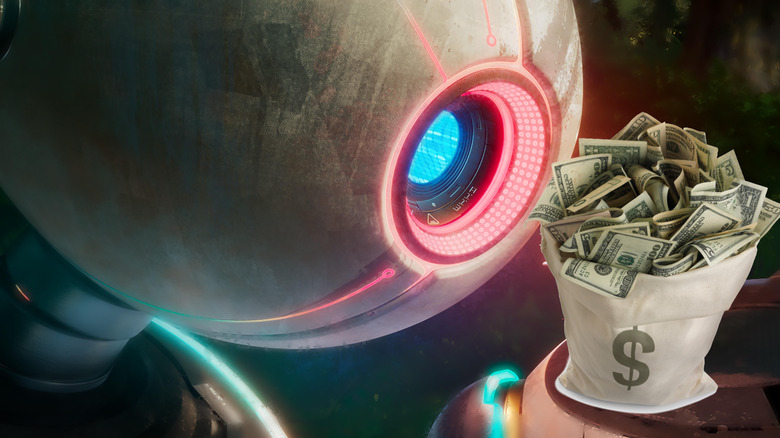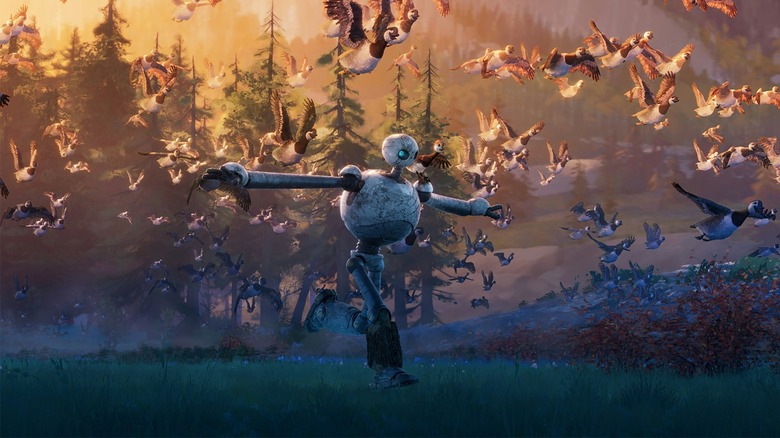The Wild Robot's Box Office Makes It A Special Kind Of Success Story In Animation
We may receive a commission on purchases made from links.
In a year that has provided its fair share of disappointments at the box office, it's always nice when we get to talk about something good that happened — if not something downright great, in this particular case. Indeed, DreamWorks and Universal's "The Wild Robot" debuted in theaters this past weekend, taking in $35 million at the domestic box office. That blew past industry expectations, in no small part thanks to the stellar reviews and word of mouth. It also set a new high-bar for non-franchise animation in the pandemic era.
That $35 million figure represents the very top end of the most optimistic projections heading into the weekend. "The Wild Robot" also pulled in $18 million overseas for a $53 million global start. To say that it is difficult to open a non-franchise animated film in the pandemic era would be an understatement. To that end, Pixar's "Elemental" opened to just over $29 million before going on a legendary run to top out with nearly $500 million worldwide. Yet, even the film's less-than-stellar debut represented the biggest opening weekend for a non-franchise animated title since the theatrical shut down in 2020 — until now.
Even though it's based on Peter Brown's book of the same name, "The Wild Robot" essentially functions as an original for most moviegoers. It's not a sequel, nor was it adapted from a TV show or some other very recognizable IP. Instead, it was a fresh animated film that managed to get on people's radar purely on the strength of its story. That's downright special in the modern era. Maybe it shouldn't be, but that's another conversation entirely. As it exists, this is an unqualified win for theatrical animation.
The film itself centers on Roz, a robot who is shipwrecked on an island that's devoid of humans but full of animals. While Roz is very advanced, she's also built to contend with humanity and not at all prepared to deal with the animal kingdom. As such, Roz must learn to adapt to her new surroundings as she soon becomes the adoptive parent of an orphaned gosling.
The Wild Robot proves original animation still has its place
Critics and audiences alike went wild for director Chris Sanders' adaptation of Brown's book. The film currently holds a stellar 98% approval rating on Rotten Tomatoes. It also earned an A CinemaScore, suggesting word-of-mouth from moviegoers will be very strong. One thing we've seen time and time again in recent years is that these animated movies can leg out like there's no tomorrow. Just look at "Migration," which opened to just $12.4 million last December before ultimately bringing in $299.8 million worldwide.
Every indicator we have suggests "The Wild Robot" is going to leg out. It even took a huge bite out of "Transformers One," as Paramount's animated entry in that long-running franchise dropped 62% in weekend two for a $9.3 million haul following its $24.6 million opening. That film also had great reviews, which means, on top of everything else, "The Wild Robot" majorly triumphed over another well-reviewed animated film that had recognizable branding. This is all very good news for DreamWorks and Universal, as well as those who want to see more original, non-franchise animation in theaters.
Overall, the pandemic era has been kind to animation. This year's "Inside Out 2" is now the biggest animated movie of all time with $1.67 billion to its name, while 2023's "The Super Mario Bros. Movie" pulled in $1.36 billion. Movies like "Puss in Boots: The Last Wish," "The Boy and the Heron," and, again, "Migration" have similarly legged out to become huge hits. Still, we need even more non-sequels/spinoffs to perform strongly.
More than that, we need films that aren't based on massive pre-existing franchises like "Mario" in general. What Sanders and DreamWorks have accomplished with "The Wild Robot" helps make a strong case to Hollywood, backed up by dollars and cents, that original animation still has its place outside of the streaming world.
"The Wild Robot" is in theaters now.

